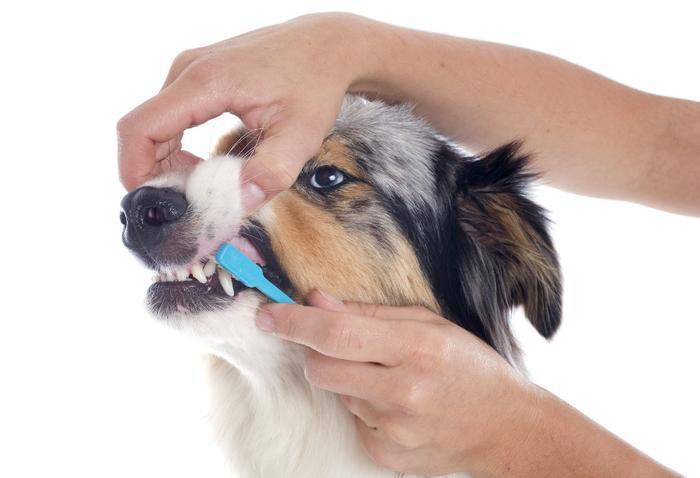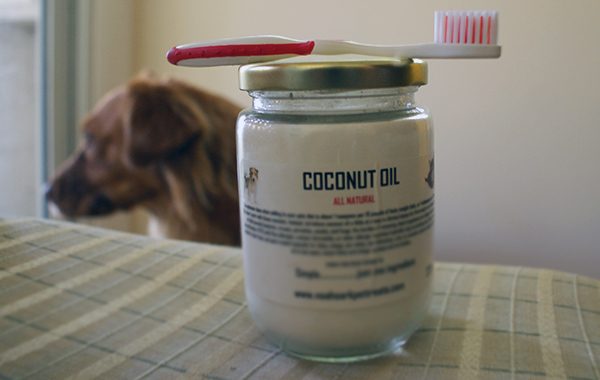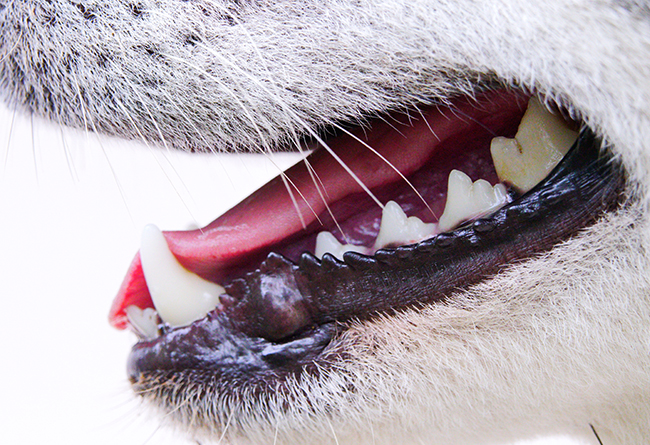Table of Contents
A Complete Guide to Enhancing Your Dog’s Oral Care
As pet owners, we’re constantly seeking ways to ensure the health and happiness of our furry companions. While regular veterinary check-ups and a balanced diet are integral components of pet care, one area that often goes overlooked is dental health. Just like humans, dogs can suffer from dental issues such as plaque buildup, gum disease, and tooth decay if their oral hygiene is neglected, which is where coconut oil for dogs teeth comes in!

Enter coconut oil – a natural, versatile substance that has gained popularity not only in human health but also in the realm of pet care. Over recent years, coconut oil has emerged as a promising remedy for enhancing canine dental health, offering a holistic approach to maintaining your dog’s pearly whites and gum integrity.
In this article, we delve into the benefits of using coconut oil for dogs’ teeth, exploring its properties, application methods, and the science behind its effectiveness. Whether you’re a seasoned pet parent or a new dog owner looking to elevate your furry friend’s dental care routine, join us on this journey to uncover the wonders of coconut oil as a potent ally in promoting your dog’s oral hygiene.
Understanding Canine Dental Health
Dental health is a crucial aspect of overall well-being in dogs, yet it’s often overlooked by pet owners. Just like humans, dogs are susceptible to a range of dental issues that can impact their quality of life if left untreated. Understanding these common dental problems is essential for maintaining your dog’s oral hygiene and overall health.
- Plaque Buildup: Plaque is a sticky film of bacteria that forms on the teeth and along the gum line. If not removed regularly, plaque can mineralize and harden into tartar, leading to gum irritation and inflammation. Plaque buildup is a common precursor to more serious dental problems in dogs.
- Tartar: Tartar, also known as dental calculus, is hardened plaque that accumulates on the teeth over time. Tartar is not only unsightly but can also contribute to gum disease and tooth decay if not addressed promptly. It cannot be removed by brushing alone and typically requires professional cleaning by a veterinarian.
- Gum Disease (Gingivitis and Periodontitis): Gum disease refers to inflammation of the gums and is commonly caused by bacterial infection resulting from plaque and tartar buildup. Gingivitis is the early stage of gum disease and is characterized by red, swollen gums that may bleed easily. If left untreated, gingivitis can progress to periodontitis, which involves irreversible damage to the gums, tooth roots, and supporting bone structure.
- Tooth Decay (Cavities): While less common in dogs than in humans, tooth decay can still occur, especially in dogs with poor dental hygiene or certain predisposing factors. Tooth decay typically results from the demineralization of tooth enamel caused by bacterial acids produced from food debris and plaque.
Importance of Dental Hygiene for Dogs
Maintaining good dental hygiene is vital for promoting your dog’s overall health and well-being. Poor dental health can lead to pain, discomfort, and a variety of health issues beyond the mouth, including:
- Chronic pain and discomfort when eating or chewing
- Bad breath (halitosis)
- Tooth loss
- Abscesses and infections
- Systemic health problems such as heart disease, kidney disease, and diabetes, which can be exacerbated by oral bacteria entering the bloodstream through inflamed gums (a condition known as bacteremia).
Properties of Coconut Oil

Coconut oil is derived from the flesh of mature coconuts and is composed primarily of saturated fats, particularly medium-chain triglycerides (MCTs). While traditionally used in cooking and skincare, coconut oil’s properties extend far beyond these realms, making it a versatile and valuable addition to canine dental care routines.
Antibacterial Properties
Coconut oil contains lauric acid, a medium-chain fatty acid known for its potent antibacterial properties. Lauric acid disrupts the lipid membranes of bacteria, including harmful oral bacteria such as Streptococcus mutans, which is a primary contributor to plaque formation and tooth decay in dogs. By inhibiting bacterial growth and reducing the population of pathogenic bacteria in the mouth, coconut oil can help prevent the onset of dental issues and promote oral hygiene in dogs.
Anti-fungal Properties
In addition to its antibacterial effects, coconut oil exhibits antifungal properties attributed to compounds like caprylic acid and capric acid. These fatty acids have been shown to combat common fungal infections in dogs, such as oral thrush (Candida albicans) and yeast overgrowth. By targeting fungal pathogens, coconut oil contributes to maintaining a balanced oral microbiome and reducing the risk of oral infections that can compromise your dog’s dental health.
Anti-inflammatory Properties
Chronic inflammation is a hallmark of many dental conditions, including gingivitis and periodontal disease. Coconut oil contains antioxidants and anti-inflammatory compounds that help mitigate inflammation and soothe irritated gum tissues. By reducing inflammation in the oral cavity, coconut oil promotes gum health and supports the body’s natural healing processes, potentially preventing the progression of periodontal disease and associated complications in dogs.
Moisturizing and Protective Effects
Coconut oil has emollient properties, meaning it helps moisturize and nourish tissues, including the delicate mucous membranes lining the mouth. Regular application of coconut oil can help maintain oral hydration, preventing dryness and discomfort in the gums. Furthermore, the protective barrier formed by coconut oil on the tooth surfaces may inhibit the adhesion of plaque-forming bacteria, thereby reducing the risk of tartar accumulation and dental decay.
Benefits of Coconut Oil for Dogs’ Teeth
Coconut oil for dogs teeth offers multiple benefits for your dog’s dental health, from reducing plaque buildup and freshening breath to soothing gum inflammation and providing nutritional support. Whether used topically or orally, coconut oil can be a valuable addition to your dog’s dental care routine, helping to keep their teeth and gums healthy and their smiles bright.
Reduces Plaque and Tartar Formation: Coconut oil for dogs teeth contains lauric acid, which has been shown to inhibit the growth of plaque-forming bacteria in the mouth. Regular application of coconut oil to your dog’s teeth can help prevent the buildup of plaque and tartar, reducing the risk of dental issues such as cavities and gum disease.
Promotes Fresh Breath: The antibacterial properties of coconut oil for dogs teeth help eliminate odor-causing bacteria in your dog’s mouth, resulting in fresher breath. By reducing the bacterial population responsible for halitosis, coconut oil can improve your dog’s oral hygiene and make interactions more pleasant for both you and your pet.
Soothes Gum Inflammation: Coconut oil’s anti-inflammatory properties can help soothe inflamed gums and alleviate discomfort associated with gingivitis or periodontal disease. Applying coconut oil for dogs teeth topically or incorporating it into your dog’s diet can provide relief from gum irritation and support the healing process.
Supports Oral Hygiene Between Brushing: While regular brushing is essential for maintaining your dog’s dental health, coconut oil for dogs teeth can serve as a supplemental oral hygiene aid. Even if your dog isn’t a fan of tooth brushing, you can still promote their oral hygiene by rubbing coconut oil onto their teeth and gums or offering coconut oil-infused dental treats.
Provides Nutritional Benefits: Coconut oil for dogs teeth is rich in medium-chain fatty acids (MCFAs), which have various health benefits for dogs when consumed orally. In addition to supporting skin and coat health, MCFAs in coconut oil may help boost your dog’s immune system and promote overall well-being. By incorporating coconut oil into your dog’s diet, you’re not only improving their dental health but also providing them with valuable nutrients.
Application Methods of Incorporating Coconut Oil for Dogs Teeth
Incorporating coconut oil for dogs teeth into your dog’s dental care routine can be done through various application methods, each offering unique benefits.
The following are several ways to utilize coconut oil for dog’s teeth:
Direct Application with Finger or Toothbrush
Apply a small amount of coconut oil for dogs teeth to your finger or a pet-specific toothbrush. Gently rub the coconut oil onto your dog’s teeth and gums, focusing on areas prone to plaque buildup. Use circular motions to ensure thorough coverage and massage the oil into the gum line. Allow your dog to lick or swallow the coconut oil, as it can provide internal benefits as well.
Coconut Oil Dental Wipes or Pads
Purchase pre-soaked dental wipes or pads infused with coconut oil specifically designed for dogs. Use these wipes or pads to gently clean your dog’s teeth and gums, similar to wiping their paws or ears. The convenient pre-soaked format makes it easy to administer coconut oil without the need for direct contact with your hands.
Coconut Oil-Infused Dental Chews or Treats:
Look for commercially available dental chews or treats that contain coconut oil for dogs teeth as an ingredient. Offer these treats to your dog as a tasty and enjoyable way to promote their dental health. The chewing action helps mechanically remove plaque and tartar while the coconut oil works its magic on their teeth and gums.
Homemade Coconut Oil Dental Treats
Create homemade dental treats using coconut oil as a key ingredient.
Combine coconut oil with other dog-safe ingredients such as oats, peanut butter, or mashed fruits and vegetables. Shape the mixture into small treats or use silicone molds for fun shapes. Freeze or refrigerate the treats until solid, then offer them to your dog as a delicious and dental-friendly snack.
Coconut Oil Supplement in Food
Incorporate coconut oil into your dog’s diet as a nutritional supplement.
Mix a small amount of melted coconut oil into their regular food, ensuring it’s well-distributed. Start with a conservative dosage and gradually increase as tolerated, monitoring your dog’s response. Regular consumption of coconut oil can provide internal benefits for overall health, including dental wellness.

Safety Considerations of Coconut Oil for Dogs Teeth
When considering the use of coconut oil for dogs teeth, it’s essential to be aware of potential risks, precautions, and dosage guidelines to ensure your pet’s safety and well-being.
- Allergies: While uncommon, some dogs may have allergies or sensitivities to coconut oil. Signs of an allergic reaction may include itching, redness, swelling, or gastrointestinal upset. If you suspect your dog is allergic to coconut oil, discontinue use immediately and consult with your veterinarian for alternative options.
- Dosage Guidelines: The appropriate dosage of coconut oil for dogs teeth can vary depending on factors such as size, weight, and overall health. It’s important to start with a small amount and gradually increase as tolerated, following the recommendations provided by your veterinarian or a qualified animal health professional. Excessive consumption of coconut oil may lead to digestive issues such as diarrhea or vomiting.
- Possible Side Effects: While coconut oil for dogs teeth is generally considered safe for dogs when used in moderation, some pets may experience mild side effects, particularly if introduced too quickly or in large quantities. These side effects may include gastrointestinal upset, loose stools, or greasy stools. Monitoring your dog’s response to coconut oil and adjusting the dosage accordingly can help minimize these effects.
- Consultation with a Veterinarian: Before incorporating coconut oil for dogs teeth or any new health regimen into your dog’s routine, it’s crucial to consult with your veterinarian. Your vet can provide personalized guidance based on your dog’s individual needs, health status, and any pre-existing conditions. They can also help determine the appropriate dosage and application method to maximize the benefits of coconut oil while minimizing potential risks.
- Alternative Options: If coconut oil for dogs teeth is not suitable for your dog due to allergies or other concerns, there are alternative dental care options available. Your veterinarian can recommend alternative products or strategies to support your dog’s oral hygiene, such as dental chews, enzymatic toothpaste, or professional dental cleanings.
Using Coconut Oil for Dogs Teeth: Importance of Consistency and Long-Term Maintenance
Consistency and long-term maintenance are crucial aspects of using coconut oil for dogs teeth. While coconut oil can offer significant benefits when incorporated into your dog’s dental care routine, it’s essential to establish a consistent regimen and monitor your pet’s oral health over time.
- Continuous Plaque Control: Plaque buildup is an ongoing process that occurs continuously in the mouth. Consistent application of coconut oil for dogs teeth helps disrupt plaque formation and prevents tartar accumulation on your dog’s teeth. By incorporating coconut oil into your dog’s daily or weekly routine, you can maintain consistent plaque control and reduce the risk of dental issues over time.
- Sustained Oral Hygiene Benefits: The benefits of coconut oil for dogs’ dental health are maximized with regular and long-term use. Consistent application of coconut oil helps maintain oral hygiene, promotes gum health, and freshens breath over time. By incorporating coconut oil into your dog’s routine, you provide ongoing support for their oral well-being and contribute to their overall health and comfort.
- Prevention of Dental Problems: Dental issues such as plaque buildup, tartar accumulation, and gum disease can develop gradually over time. Consistent use of coconut oil helps prevent these problems from occurring or worsening by inhibiting bacterial growth and promoting a healthy oral environment. By maintaining a regular coconut oil regimen, you can help prevent the need for more invasive dental procedures in the future.
Guidance on Administration and Monitoring
- Frequency of Administration: The frequency of coconut oil for dogs teeth treatments for your dog can vary depending on factors such as their age, dental health status, and individual needs. As a general guideline, consider incorporating coconut oil into your dog’s dental care routine 2-3 times per week for maintenance. However, if your dog has specific dental issues or requires more intensive care, you may need to administer coconut oil more frequently under the guidance of your veterinarian.
- Application Methods: Choose an application method that is convenient and well-tolerated by your dog. Whether you opt for direct finger application, tooth brushing, dental wipes, or coconut oil-infused treats, ensure that the process is comfortable for your pet and fits seamlessly into their routine.
- Monitoring Oral Health: Regularly monitor your dog’s oral health by inspecting their teeth, gums, and breath. Look for signs of plaque buildup, tartar accumulation, gum inflammation, or changes in breath odor. Additionally, observe your dog’s behavior during coconut oil treatments to ensure they are comfortable and not experiencing any adverse reactions.
- Veterinary Check-ups:Schedule regular veterinary check-ups to assess your dog’s dental health and receive professional guidance on oral care. Your veterinarian can provide personalized recommendations based on your dog’s individual needs and help you adjust your coconut oil regimen as necessary.
READ ALSO
- Dental Care For Your Dog: How To Keep Their Teeth In Good Shape
- Pregnant Dog Care Tips – 9 Comprehensive Signs, Care, and Preparing for Puppies
- Mastering the Art of Long Haired Chiweenie Care: Top 10 Tips for Caring for Your Long Haired Chiweenie
- Nurturing Your Belgian Sheepdog Puppies: A Complete Guide to 5 Training Tips and Care
FAQs
Can I put coconut oil on my dog's teeth?
If you're looking for a more natural way to brush your dog's teeth, consider using coconut oil. Coconut oil is safe for dogs to consume, and can help reduce plaque and tartar build-up on their teeth. To use coconut oil to brush your dog's teeth, simply rub a small amount of coconut oil onto their teeth and gums.
How do you brush a dog with coconut oil?
Let the coconut oil stay on your dog's skin and in his fur for about ten minutes. In this time the coconut oil will work to soften the skin and improve his discomfort. Once the oil has had time to set and work, brush your dog thoroughly to spread the oil through the layers of fur and down into the skin.
Do I have to rinse coconut oil off my dog?
Because of the oily properties of coconut oil baths, you will want to wash and rinse the coconut oil off your pup after the oil has had time to soak in a bit. This may make for a longer bathing session. If your dog is bored or upset about this, offer them treats.




